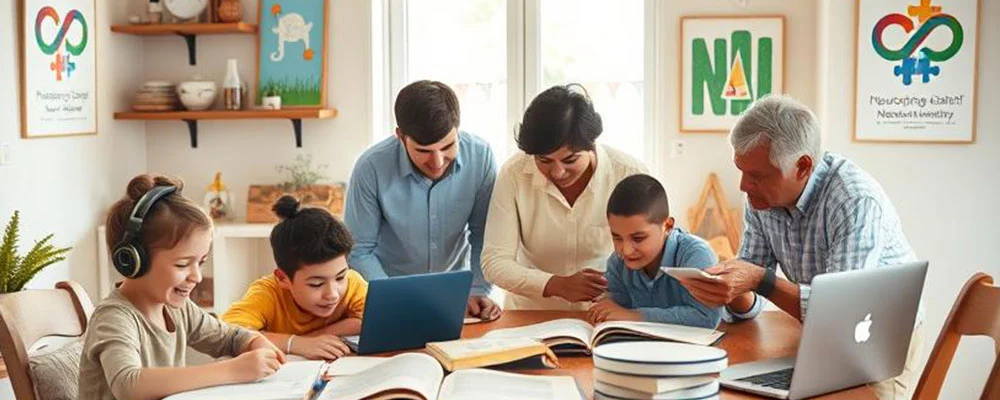How to stay up to date with neurodiversity for your loved one is an essential journey for families and friends in the USA supporting neurodivergent individuals. By staying informed, you can provide meaningful care, advocate effectively, and foster an inclusive environment. This guide offers practical steps to deepen your understanding of neurodiversity, ensuring you remain equipped to support your loved one’s unique needs and strengths.

Supporting a neurodivergent loved one, such as someone with autism, ADHD, or dyslexia, requires ongoing learning and engagement. Neurodiversity is a rapidly evolving field, with new research, perspectives, and resources emerging regularly. For caregivers in the USA, knowing how to stay up to date with neurodiversity for your loved one is key to building stronger relationships and advocating for their rights. This article provides actionable strategies, from educational resources to community involvement, to help you stay informed and empowered while centering your loved one’s experiences.
Table of Contents
What is Neurodiversity?
Neurodiversity refers to the natural variations in human brain function and behavioral traits. It recognizes that conditions like autism, ADHD, dyslexia, and others are not disorders but part of the spectrum of human diversity. Each neurodivergent individual has unique strengths, challenges, and ways of processing the world. For example, someone with autism may excel in pattern recognition, while a person with ADHD might thrive in dynamic, creative environments. Understanding neurodiversity is the foundation for learning how to stay up to date with neurodiversity for your loved one, as it shifts the focus from “fixing” differences to celebrating and supporting them.
1. Educate Yourself on Neurodiversity
To effectively support your loved one, start by learning about neurodiversity. Numerous resources are available, including books, articles, and online courses. Begin with acclaimed books like NeuroTribes by Steve Silberman, which explores the history and culture of autism, or The Reason I Jump by Naoki Higashida, offering insights into the autistic experience. These works highlight the challenges and strengths of neurodivergent individuals.
Online platforms like Coursera and Udemy offer courses on neurodiversity, covering the latest research and practical strategies. These structured programs can build a strong foundation for understanding how to stay up to date with neurodiversity for your loved one. Regularly engaging with credible sources ensures you remain informed about evolving perspectives and support methods.
2. Follow Neurodiversity Blogs and Websites
Staying current with neurodiversity requires keeping up with reputable online resources. Bookmark and regularly visit websites that provide up-to-date information, personal stories, and advocacy tools. Key sites include:
- Autistic Self Advocacy Network (ASAN): A leading resource for autism advocacy, offering articles, policy updates, and community insights.
- Neurodiversity Hub: Provides resources, articles, and a rights statement for neurodivergent individuals.
- Attention Deficit Disorder Association (ADDA): Focuses on ADHD, with webinars, articles, and support tools.
These platforms are essential for learning how to stay up to date with neurodiversity for your loved one, as they share the latest developments and practical advice. Check them weekly for new content.
3. Join Neurodiversity Online Communities
Social media platforms like Facebook, Reddit, and X host vibrant neurodiversity communities. These groups offer spaces for advocacy, support, and celebration of neurodivergent identities. Join groups like “Neurodiversity Advocates” on Facebook or subreddits such as r/autism to engage with neurodivergent individuals and caregivers.
Listening to community members’ experiences provides valuable perspectives on how to stay up to date with neurodiversity for your loved one. Approach these spaces with respect, actively participate, and share relevant resources to build connections and knowledge.
4. Attend Neurodiversity Workshops and Conferences
Workshops and conferences offer opportunities to learn from experts and connect with others supporting neurodivergent individuals. Look for events hosted by organizations like ASAN or ADDA, available both in-person across the USA and online. These gatherings cover cutting-edge research, support strategies, and personal narratives, helping you stay informed about neurodiversity.
Search Eventbrite or organizations’ social media for upcoming events. Attending these sessions equips you with practical tools and networks to enhance how you stay up to date with neurodiversity for your loved one.
5. Read Neurodiversity Research Articles
For a deeper understanding, explore academic research on neurodiversity through platforms like Google Scholar or PubMed. Search for studies on autism, ADHD, or dyslexia to uncover the latest findings on supports and lived experiences. While some articles may be complex, they offer authoritative insights into how to stay up to date with neurodiversity for your loved one.
Focus on open-access journals or university libraries for free access. Summarize key findings to share with your loved one or their support network, strengthening your advocacy efforts.
6. Listen to Neurodiversity Podcasts
Podcasts are a convenient way to learn about neurodiversity while on the go. Subscribe to shows like:
- The Neurodiversity Podcast: Features interviews with neurodivergent individuals and experts.
- Autism Spectrum News: Covers autism-related topics with an NPR-style approach.
- ADHD Rewired: Shares strategies and stories for navigating ADHD.
These podcasts blend education with engaging storytelling, making them ideal for busy caregivers. Listening regularly helps you stay up to date with neurodiversity for your loved one while fitting into your daily routine.
7. Engage Directly with Your Loved One
Open communication with your neurodivergent loved one is one of the most effective ways to stay informed. Ask about their experiences, challenges, and interests. Encourage them to share articles, videos, or resources that resonate with them. Discussing these materials fosters mutual understanding and strengthens your relationship.
This direct engagement ensures you’re learning how to stay up to date with neurodiversity for your loved one in a way that centers their perspective, making your support more meaningful.
8. Advocate for Neurodiversity Awareness
Advocacy is a powerful way to support your loved one and promote broader acceptance. Share key messages in your community, workplace, or school:
- Neurodiversity reflects natural human variation, not a disorder.
- Neurodivergent individuals process information uniquely and have valuable strengths.
- Inclusive environments benefit everyone.
By advocating, you contribute to a more equitable society while learning how to stay up to date with neurodiversity for your loved one through community feedback and discussions.
9. Stay Open-Minded and Adaptable
The field of neurodiversity evolves with new research and perspectives. Embrace flexibility by updating your understanding as new information emerges. Adapting your approach based on the latest insights shows strength and commitment to supporting your loved one effectively.
Follow thought leaders on X or subscribe to newsletters from neurodiversity organizations to stay informed. This adaptability is crucial for how to stay up to date with neurodiversity for your loved one.
10. Prioritize Self-Care
Supporting a neurodivergent loved one can be emotionally demanding. Practice self-care through activities like exercise, meditation, or journaling. Seek support from friends, support groups, or professionals to maintain your well-being. A healthy you is better equipped to learn how to stay up to date with neurodiversity for your loved one.
Conclusion
Staying informed about neurodiversity is an ongoing journey of education, engagement, and advocacy. By leveraging resources like books, websites, podcasts, and community connections, you can build a robust understanding of how to stay up to date with neurodiversity for your loved one. Center their voice, remain adaptable, and prioritize self-care to provide meaningful support. Together, these efforts foster a more inclusive world for neurodivergent individuals.



Add Comment